For many dog lovers, the idea of a furry companion is delightful, but the reality of constant shedding can be a deal-breaker. If you’re on the hunt for a low-maintenance friend and specifically searching for small dog breeds that don’t shed for sale, you’ve come to the right place. These charming, compact canines offer the joy of pet ownership without the perpetual battle against dog hair, making them ideal for allergy sufferers, apartment dwellers, or anyone who simply prefers a cleaner home. Our comprehensive guide will walk you through popular non-shedding small breeds, highlight their unique traits, and provide crucial advice on how to responsibly find and welcome one of these delightful puppies into your family. Get ready to discover your next furry, non-shedding companion!
Why Choose a Small, Non-Shedding Dog?
The appeal of small dogs that don’t shed extends beyond just a clean home. For individuals with pet allergies, these breeds are often considered hypoallergenic, as their hair (rather than fur) produces less dander, the primary allergen. This makes pet ownership possible for many who otherwise couldn’t enjoy the companionship of a dog. Furthermore, their compact size is perfectly suited for smaller living spaces, requiring less room for exercise while still offering boundless love and loyalty. While “non-shedding” doesn’t mean “no maintenance”—their unique coats often require regular grooming—the trade-off for a hair-free environment is well worth the effort for many prospective owners. Exploring various breeds of small dogs that don’t shed can help you identify the ideal match for your lifestyle.
Exploring Popular Small Dog Breeds That Don’t Shed
From playful companions to quiet lapdogs, the world of small, non-shedding breeds is wonderfully diverse. Each breed brings its own set of characteristics, grooming requirements, and charming quirks.
Affenpinscher
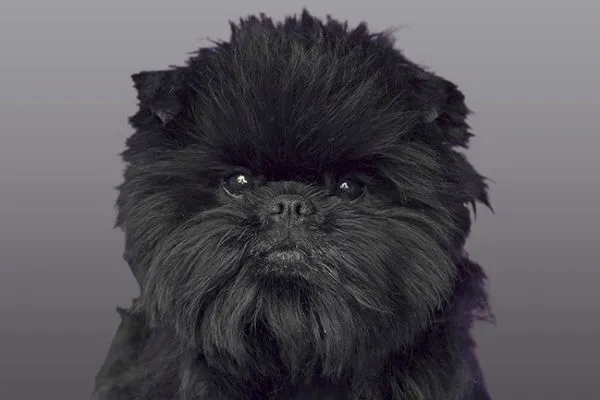 Affenpinscher puppy with wiry, low-shedding black coat
Affenpinscher puppy with wiry, low-shedding black coat
The Affenpinscher, aptly named “monkey-like terrier,” is a small, intelligent, and fiercely independent dog with a distinctive wiry coat. Despite their tiny stature, these fearless companions make excellent watchdogs, ever alert to their surroundings. Their low-shedding coat requires minimal attention, typically just a twice-weekly brushing to keep it neat and free of tangles. Known for their humorous personalities and virtually odorless coat, Affenpinschers are a great choice for those seeking a unique and low-maintenance small dog breed that doesn’t shed for sale, adding laughter and loyalty to any home.
Basenji
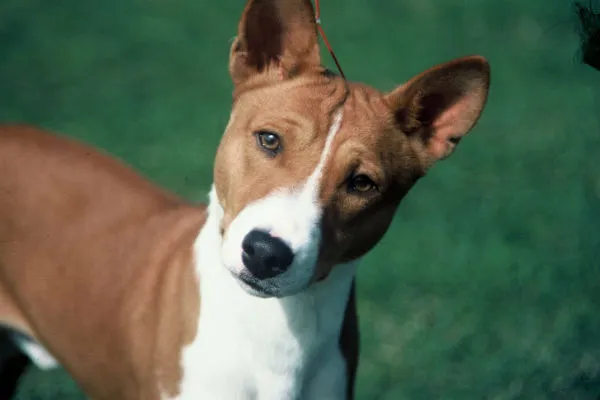 Basenji puppy with short, fine, low-shedding red and white coat
Basenji puppy with short, fine, low-shedding red and white coat
Often called the “barkless dog” due to their unique yodel-like vocalizations, the Basenji offers a distinct hound experience without the typical shedding and odor. This sleek, short-coated breed sheds very minimally, making grooming a breeze with just an occasional brush-over. Basenjis are intelligent, energetic, and famously quiet, making them ideal for apartment living as long as they receive ample daily exercise and mental stimulation. Their clean habits and independent nature appeal to owners looking for a sophisticated and low-shedding companion.
Bichon Frise
 Bichon Frise puppy with fluffy, non-shedding white coat
Bichon Frise puppy with fluffy, non-shedding white coat
The Bichon Frise is the quintessential small non-shedding dog breed, cherished for its playful demeanor and charming “powder-puff” appearance. These affectionate dogs are often recommended for people with allergies due to their truly non-shedding hair. However, their continuously growing coat demands frequent grooming, including daily brushing and regular professional trims, to prevent matting and maintain their iconic fluffy look. For those seeking a lively, devoted companion and are prepared for consistent grooming, a Bichon Frise puppy for sale can bring immense joy.
Bolognese
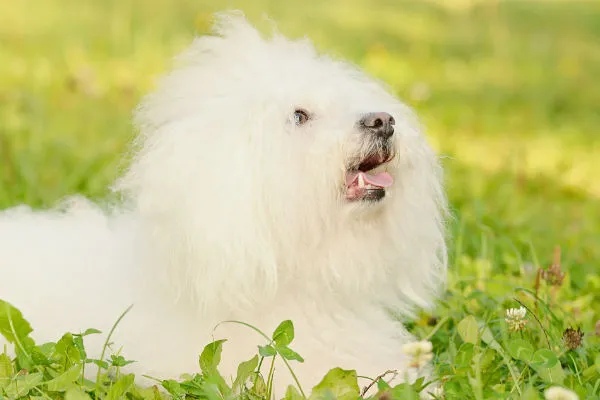 Bolognese puppy with distinctive fluffy, non-shedding white coat
Bolognese puppy with distinctive fluffy, non-shedding white coat
Sharing a similar lineage with the Bichon Frise, the Bolognese boasts a unique fluffy coat composed of hair rather than fur, making it another excellent choice for those seeking small dog breeds that don’t shed for sale. While they don’t shed, their exquisite white coat requires diligent daily grooming to remove dead hairs and prevent tangles, ensuring these lovable lap dogs always look their best. Bolognese are calm, devoted, and thrive on companionship, making them perfect for owners who can provide consistent attention and grooming. You can find more information about small types of dogs that don’t shed that might fit your home.
Brussels Griffon
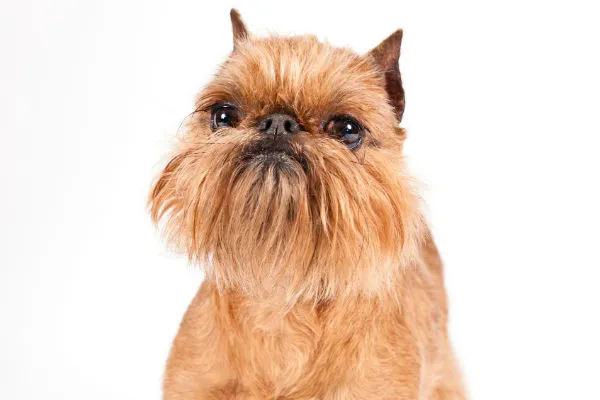 Brussels Griffon puppy with wiry, low-shedding coat and expressive face
Brussels Griffon puppy with wiry, low-shedding coat and expressive face
Despite their diminutive size, Brussels Griffons are robust and spirited dogs, not ones to be pampered excessively. Available in both smooth and rough-coated varieties, both types are minimal shedders, benefiting from regular grooming. Their small stature means a daily walk and indoor play typically satisfy their exercise needs. These loyal little dogs thrive in homes where they receive plenty of human interaction, making them ideal for individuals or families frequently at home and looking for a characterful small dog that doesn’t shed for sale.
Chinese Crested
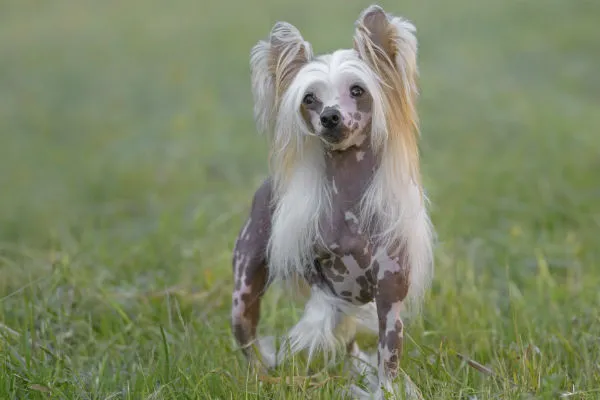 Hairless Chinese Crested puppy with tufts of hair on head, tail, and paws
Hairless Chinese Crested puppy with tufts of hair on head, tail, and paws
For a truly minimal shedding experience, the Chinese Crested offers a unique option, coming in two distinct coat types: hairless and powderpuff. The hairless variety has sparse hair on its head, tail, and feet, virtually eliminating shedding. The powderpuff, by contrast, is covered in a soft, fine coat that sheds very minimally. Hairless varieties require extra skin care to protect against sun and cold. Both types are affectionate, playful, and make charming companions, offering an intriguing choice for those interested in very small dog breeds that don’t shed for sale.
Coton De Tulear
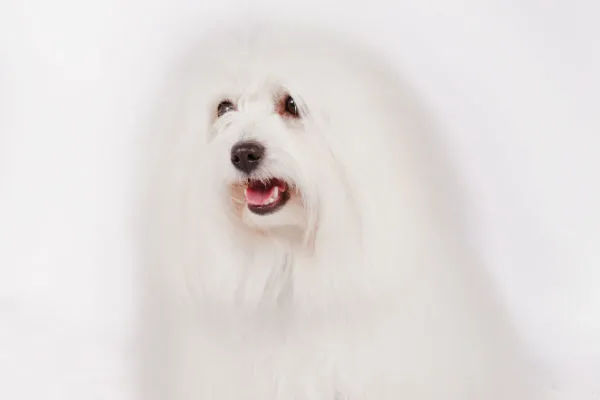 Coton de Tulear puppy with distinctive long, fluffy white coat
Coton de Tulear puppy with distinctive long, fluffy white coat
The Coton de Tulear, often referred to as the “Royal Dog of Madagascar,” possesses a distinctive, long, fluffy coat that is considered hypoallergenic and truly non-shedding. This makes them an excellent choice for allergy sufferers. While their cotton-like coat requires daily grooming to prevent matting, their lighthearted, gentle, and eager-to-please nature makes the effort incredibly rewarding. A Coton de Tulear puppy for sale promises a cheerful and devoted family member.
Havanese
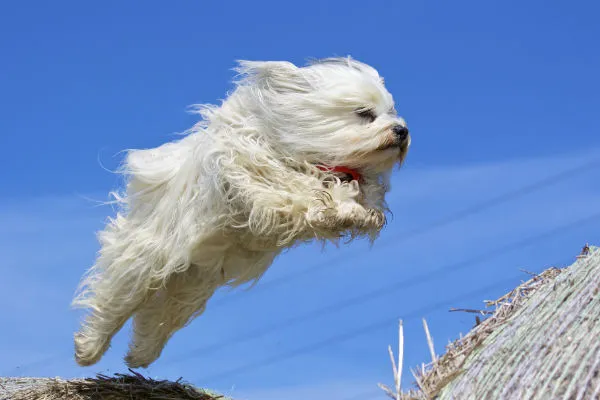 Havanese puppy with long, flowing, non-shedding coat
Havanese puppy with long, flowing, non-shedding coat
Native to Cuba, the Havanese charms owners with its spunky personality and a coat that doesn’t shed, meaning less time spent lint-rolling and more time playing. Their long, silky coat requires weekly brushing and regular baths to keep it clean and healthy, but their adaptability and intelligent nature make them easy to live with. Havanese are known for their lively and affectionate temperament, making them one of the most sought-after small dogs that don’t shed and stay small for sale.
Maltese
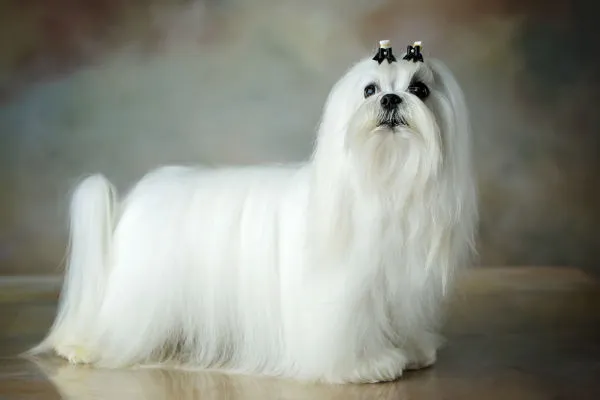 Maltese puppy with long, silky, non-shedding white coat
Maltese puppy with long, silky, non-shedding white coat
Maltese dogs have captivated hearts for millennia with their elegant appearance and affectionate disposition. This ancient breed boasts a long, flowing white coat that sheds very little, making them an ideal lap dog and a top choice among small dog breeds that don’t shed for sale. Regular daily brushing is crucial to prevent mats, and occasional baths maintain the pristine condition of their silky hair. Maltese are gentle, intelligent, and thrive on human companionship, making them perfect for devoted owners.
Lhasa Apso
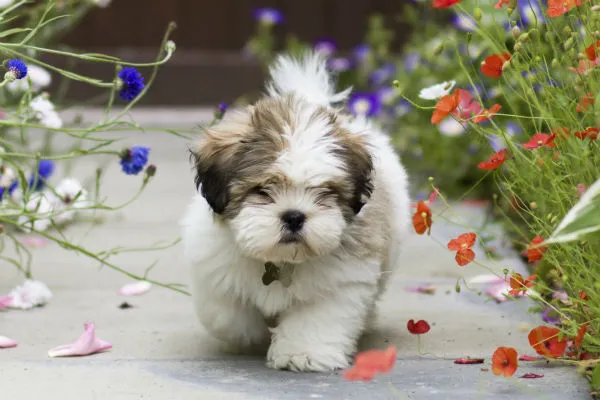 Lhasa Apso puppy with long, heavy, non-shedding coat
Lhasa Apso puppy with long, heavy, non-shedding coat
Originating from Tibet, the Lhasa Apso is a robust small dog breed known for its calm yet playful demeanor. These charming companions enjoy brisk walks and snuggling in their owner’s lap. Lhasa Apsos do not shed, but their long, dense coats require consistent maintenance. Many owners opt for a “puppy cut” to simplify daily grooming and brushing, which is essential to prevent tangles. Their independent yet loyal nature makes them excellent watchdogs and devoted family members.
Miniature Schnauzer
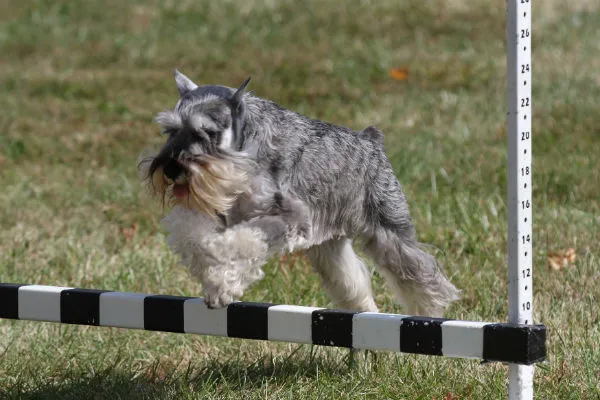 Miniature Schnauzer puppy with wiry, low-shedding salt-and-pepper coat
Miniature Schnauzer puppy with wiry, low-shedding salt-and-pepper coat
The Miniature Schnauzer is a smart, trainable, and cheerful Terrier breed that strongly resembles its larger cousins. This adaptable dog sheds very little and thrives in both city and country settings, as long as they are close to their human family. Their distinctive wiry coat requires weekly brushing and regular professional grooming to maintain its crisp texture and neat appearance. Miniature Schnauzers are bold, energetic, and highly intelligent, making them a popular choice for those seeking a small to medium dog that doesn’t shed and offers both companionship and a playful spirit.
Poodle
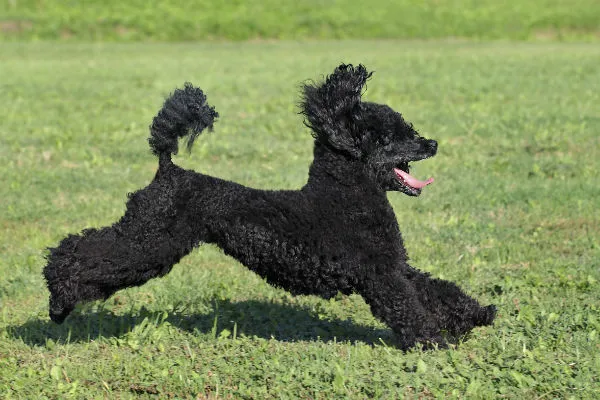 Poodle puppy with curly, non-shedding coat
Poodle puppy with curly, non-shedding coat
When people think of small dogs that don’t shed, Poodles often come to mind, and for good reason. Miniature and Toy Poodles offer the same non-shedding, hypoallergenic qualities as their Standard counterparts, simply in a more compact package. These highly intelligent dogs are easily trainable and excel in various activities. Their signature curly coat requires regular professional grooming to prevent matting and keep them looking their best. Active, proud, and incredibly smart, Poodle puppies for sale are a fantastic option for families ready for an engaged and impeccably groomed companion.
Scottish Terrier
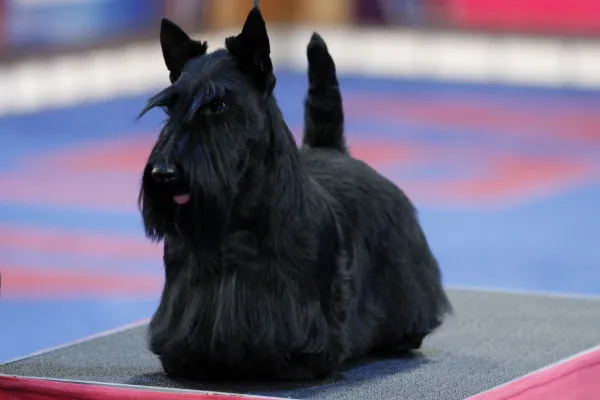 Scottish Terrier puppy with wiry, low-shedding black coat
Scottish Terrier puppy with wiry, low-shedding black coat
The Scottish Terrier, or “Scottie,” is renowned for its boldness, confidence, and big personality packed into a small frame. Their wiry, weather-resistant coat sheds very little, although it does require regular brushing, grooming, and occasional hand-stripping to maintain its healthy texture and characteristic outline. Scotties are clever and independent with a strong prey drive, making them captivating but requiring owners to be mindful around smaller animals. For those looking for a tenacious and low-shedding terrier, a Scottish Terrier puppy for sale brings a distinct charm.
Shih Tzu
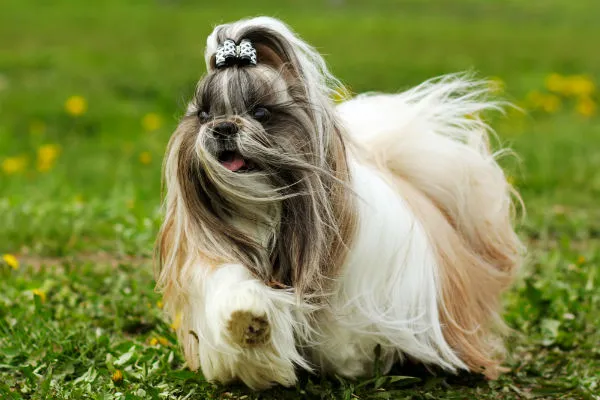 Shih Tzu puppy with long, silky, non-shedding coat and playful expression
Shih Tzu puppy with long, silky, non-shedding coat and playful expression
With a long and regal pedigree, the Shih Tzu was once the favored house pet of the Tang Dynasty. These “little lion dogs” are celebrated for their long, silky hair that is very low-shedding and looks exceptionally regal when brushed. Sturdy and lively, Shih Tzus were bred purely for companionship, and their gentle, trusting nature makes them exceptional pets. Their beautiful coats require daily brushing to prevent tangles and keep them in prime condition, a small effort for such a devoted and charming member of the family.
West Highland White Terrier
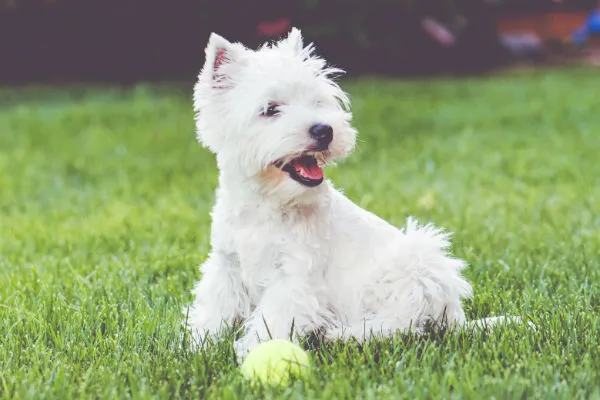 West Highland White Terrier puppy with coarse, low-shedding white coat
West Highland White Terrier puppy with coarse, low-shedding white coat
Affectionately known as “Westies,” the West Highland White Terrier boasts a coarse, white coat that sheds very little. These sturdy little dogs are intelligent, loyal, happy, and immensely entertaining. Westies are curious with moderate energy levels and possess the independent streak common among Terriers, which can sometimes make training a delightful challenge. Their spirited nature and low-shedding qualities make them a popular choice for active families looking for a tenacious and lovable companion.
Xoloitzcuintli
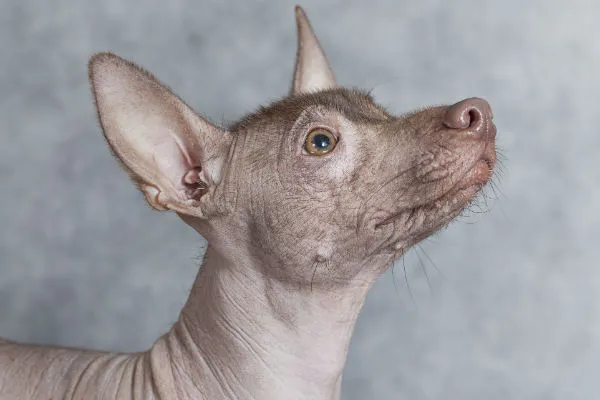 Hairless Xoloitzcuintli puppy with smooth, minimal hair on head
Hairless Xoloitzcuintli puppy with smooth, minimal hair on head
The Xoloitzcuintli, or Mexican Hairless Dog, is an ancient and rare breed that comes in both hairless and coated varieties. The hairless type has minimal hair on their heads, while the coated variety has a very short, fine coat that sheds minimally. As with other hairless breeds, Xolos require special skin care to protect them from the elements. These attentive watchdogs are also affectionate companions, known for their tranquil personality at home despite enjoying vigorous play. A Xolo puppy for sale offers a unique and devoted pet for the right owner.
Yorkshire Terrier
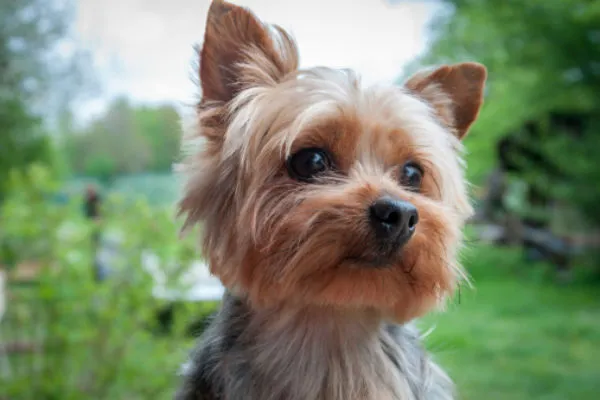 Yorkshire Terrier puppy with silky, non-shedding coat and alert expression
Yorkshire Terrier puppy with silky, non-shedding coat and alert expression
The Yorkshire Terrier, or “Yorkie,” is a spunky, affectionate Toy breed packed with personality. These beloved lap dogs are incredibly popular, and for good reason: they do not shed. Their long, silky coats are stunning when brushed daily, a manageable task given their small size. Don’t be fooled by their regal appearance; Yorkies have working-class roots, having hunted rats in English clothing mills. Today, they are just as happy to sit on a lap as they are to engage in playful antics, making them a fantastic small dog breed that doesn’t shed for sale for those seeking a lively and loyal friend.
Navigating Your Search for a Non-Shedding Puppy
Finding your ideal small dog breeds that don’t shed for sale requires a responsible approach to ensure you bring home a healthy, well-adjusted puppy. Start by researching reputable breeders who prioritize the health and temperament of their dogs. Good breeders will be transparent about health clearances for the parents, allow you to visit their facility, and provide references. Avoid puppy mills, which often hide behind misleading online ads and prioritize profit over animal welfare, leading to significant health and behavioral issues. Alternatively, consider breed-specific rescues, which often have older dogs needing loving homes. Ask thorough questions about the puppy’s background, socialization, and dietary needs. Remember, a responsible purchase is an investment in a happy and healthy future for your new companion.
Essential Care for Your Non-Shedding Companion
While minimal shedding is a huge advantage, it’s crucial to understand that these breeds still require significant care, especially regarding their coats. Most non-shedding dogs have continuously growing hair, necessitating regular brushing—often daily—to prevent mats and tangles. Professional grooming every 4-8 weeks is also typically required to trim their coats and maintain cleanliness. Beyond grooming, ensure your new puppy receives a high-quality diet appropriate for their size and age, along with consistent exercise tailored to their breed’s energy levels. Early training and socialization are also vital for developing a well-behaved and confident dog. By committing to their specific needs, you’ll foster a long and joyful companionship with your non-shedding friend.
Conclusion
Choosing a small dog that doesn’t shed for sale can bring immense joy and convenience to your life, especially if you’re an allergy sufferer or prefer a cleaner home. From the spirited Yorkshire Terrier to the elegant Poodle, there’s a perfect companion waiting for you. Remember that while these breeds minimize shedding, they often require diligent grooming to keep their unique coats healthy. Prioritize finding a reputable breeder or rescue organization to ensure you welcome a healthy, happy puppy into your home. By thoroughly researching breeds and committing to responsible pet ownership, you’re set to embark on a wonderful journey with your new, low-shedding best friend. Explore Dog Care Story for more insights into caring for your beloved canine companion!
